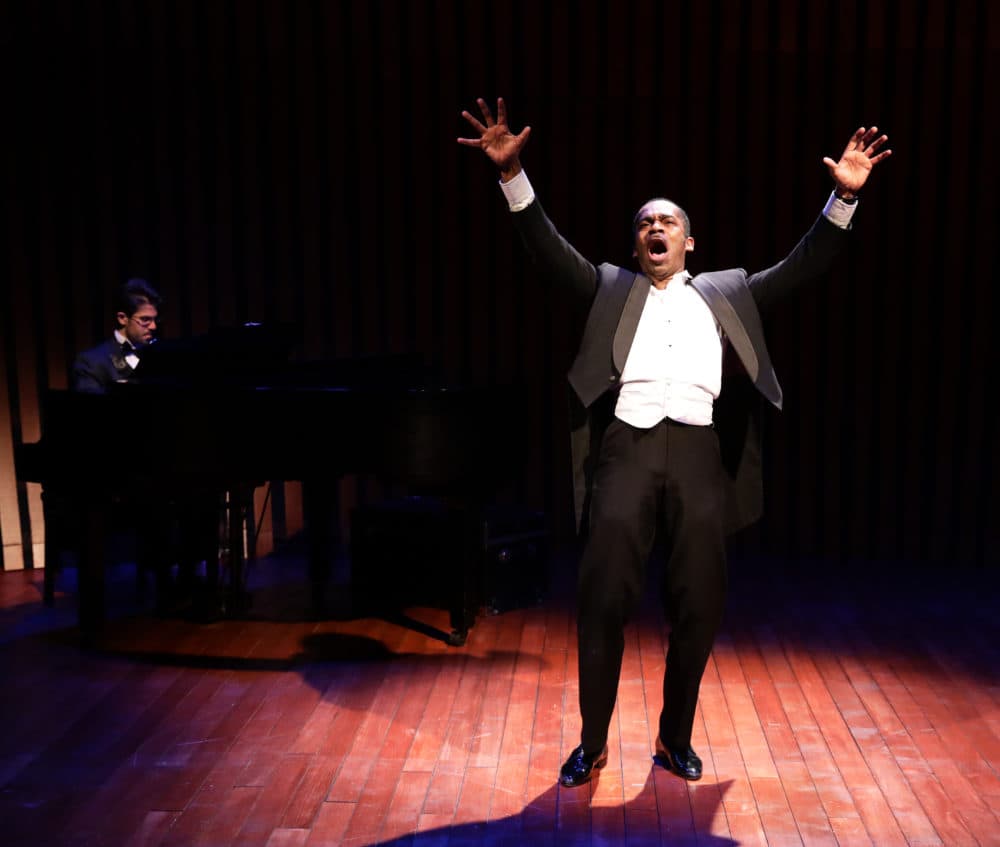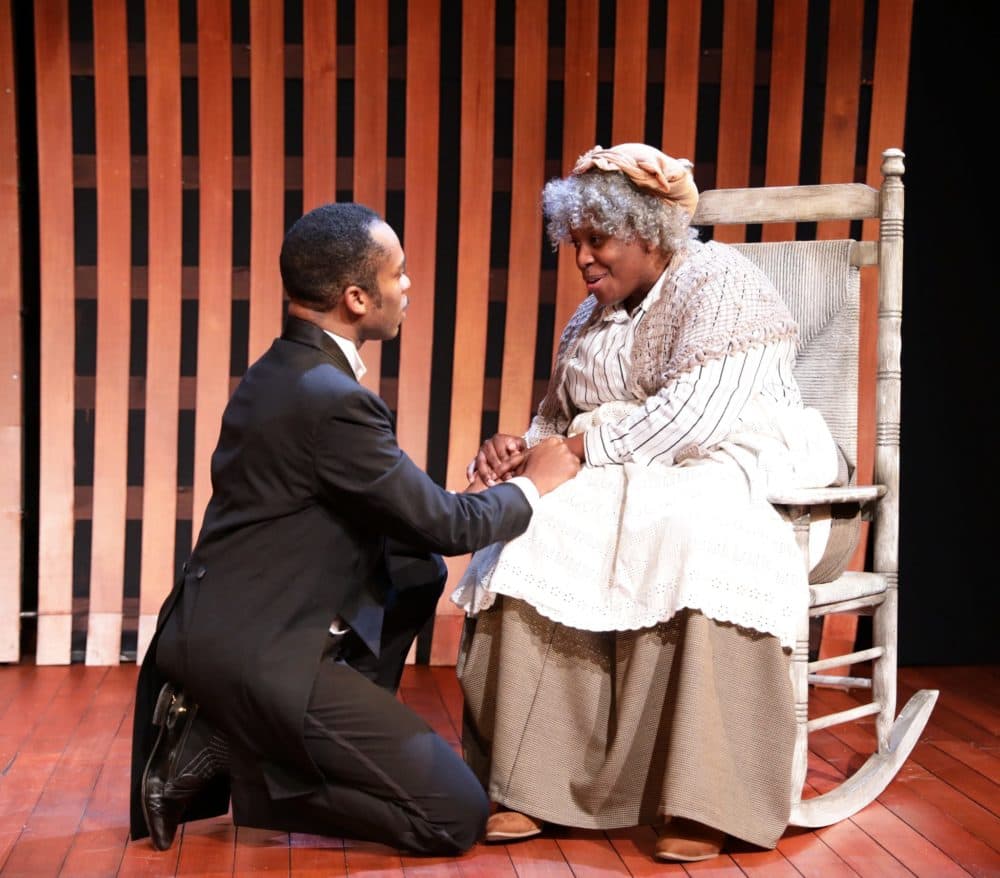Advertisement
Review
Front Porch And The Lyric Paint A Stirring Musical Portrait Of Roland Hayes

With “Breath and Imagination,” the new Front Porch Arts Collective hits the stage with the strength of a whole house, its firm, heartfelt foundations classical art song and the black church.
Daniel Beaty’s wrenching memory play with music, subtitled “The Story of Roland Hayes,” sheds a personal light on the great African-American tenor born to former slaves, who grew up to sing for European royalty and the patrons of Carnegie and Symphony halls. Framed as a play within a concert, the theater piece was produced by ArtsEmerson in 2015, as well as on various stages before and since.
Here it’s seen and gloriously heard in a co-production of the Front Porch, which bills itself as “a new black and brown led theater company committed to advancing racial equity in Boston through theater,” and the Lyric Stage Company of Boston, in whose intimate confines it not only conjures the first part of Hayes’ long life (he lived to be 90) but whips his personal struggle and artistic triumph into a tsunami of faith and song (through Dec. 23).
Helmed by Front Porch executive director Maurice Emmanuel Parent (an acclaimed actor making his professional directorial debut), “Breath and Imagination” begins in 1942 as the then-renowned 55-year-old Hayes embarks on a benefit concert for an integrated music school he plans to open on the north Georgia land where his parents were once enslaved. At the Lyric, in the person of Davron S. Monroe, Hayes commands a mostly bare stage, backed by warm-hued wooden slats and a grand piano manned by musical director Asher Denburg.
The play then flashes back to the cusp of the 20th century, when Hayes’ stoically religious mother, whom he calls Angel Mo’, prods the sulky, self-conscious youth into singing in church. Portraying Hayes, Monroe, though he never changes out of his formal concert attire, proves thoroughly convincing as an exasperated adolescent — though there is nothing half-grown about his cords.
As Hayes takes the stage in 1942, his consummate artistry has long been proven — though it counts for little in Jim Crow Georgia, where the singer’s wife and daughter have just been arrested for inadvertently sitting in the whites-only area of a shoe store and where Hayes, demanding their release, has been clubbed by a white policeman. Repeatedly, as the play returns from Hayes’ memories to the concert stage, we see the recently beaten singer double over in pain as his accompanist hits a clanging chord on the piano. Though the music he will sing — ranging from deeply felt spirituals to gorgeous Schumann lieder and a Fauré art song — is beautiful, the performance will be marked by physical pain and a tempered rage to which Hayes only gives vent in a stirring speech toward the end.
Though the immediate motivation for that anger is the racist affront on Hayes’ wife and daughter, they don’t figure as flesh-and-blood characters in “Breath and Imagination.” The emotional focus of Beaty’s biographical play is Hayes’ profound if sometimes contentious relationship with the devout mother who refuses to believe a black man can make a living singing. (Hayes’ father died in a factory accident when his son was only 11.) Here Angel Mo’ is portrayed with richly voiced religious ardor and near-magisterial weariness by Yewande Odetoyinbo, whose rapt delivery of the spirituals is as formidable as the character’s love for the son who reveres her even if, in pursuit of his artistry, he can’t always please her.

Advancing chronologically, the memory part of the play moves with Hayes and his mother from Georgia to Chattanooga, where the young tenor is taught "formal singing" by a white coach called Mr. Calhoun, gently if firmly played by Doug Gerber. (The other small roles, both white and African-American, are assayed by white actor Nile Scott Hawver, which, in the case of a black preacher, is a bit jarring.)
It is in the thrall of a scratchy Caruso coming through Mr. Calhoun’s phonograph that the young Hayes resolves to become "an artist" — an ambition that takes him from Nashville’s Fisk University, where he is soloist with the Fisk Jubilee Singers, to Boston, where he commandeers a sellout crowd at Symphony Hall, to the royal courts and recital stages of Europe, where talent, technique and what Angel Mo’ calls “the pain and the promise of yo’ people in your throat” combine to make his sound unique.
Beaty has done a skilled job of folding Hayes’ uphill if ultimately inspiring biography into what is essentially a poignant and oft-thrilling musical experience. It has been simply staged by Parent as a kind of singspiel, in which dialogue scenes serve as bridges but are subordinate to the music, which here takes the equally compelling forms of the African-American spiritual (including a few made secularly famous by Mahalia Jackson) and the German art song, including two stunners from Schumann’s “Dichterliebe.”
But how awkward it would be, however promising the bare bones, to build the story of a great singer on a mediocre one. Not to worry. Whether Hayes is pushing a plow with his mom or standing proud on the concert stage, the nimble, smoldering Monroe, who has appeared in featured roles in musicals around town (as well as in opera and with symphony orchestras elsewhere), proves himself a melodious force to be reckoned with.
When the tenor’s 18-year-old Hayes, about to be rejected unheard by the prim lady director of the Fisk Jubilee Singers, quickly cues the accompanist and launches into a powerful rendition of “Ich will mein Seele tauchen” from “Dichterliebe,” you understand the siren call pulling the dismissive lady back to the parlor. And when Monroe’s Hayes, his artistic confidence building as he embraces his heritage, ascends to the breathless gravity of “Were you there when they crucified my Lord?,” allowing that “Ooh sometimes it causes me to tremble,” I did some trembling myself.
"Breath and Imagination" is at the Lyric Stage through Dec. 23.
